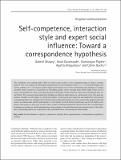Self-competence, interaction style and expert social influence: Toward a correspondence hypothesis

Auteur, co-auteurs
Type de référence
Date
2002Langue de la référence
AnglaisEntité(s) de recherche
Résumé
The conditions were studied under which an expert source induces a less competent target to adopt a contrary point of view in a context of information transmission. In an experiment with a 2 × 2 × 2 factorial design, university students (N = 157) had to predict (high involvement) or not (low involvement) the findings of a bogus scientific study carried by a researcher on friendship groups, and to estimate their ability (high versus low) to assess such predictions. They were then presented with bogus results from this study that contradicted their initial beliefs. The researcher presented these findings in either an authoritarian or a democratic style. The main dependent variable was the degree to which participants went beyond mere approval and adopted the information contradicting their own initial position. Results showed that information was more extensively adopted when the source was democratic and the participants a) were highly involved in their predictions and b) felt highly competent with respect to this type of task. These results confirmed predictions derived from the correspondence hypothesis according to which appropriation of knowledge is favored when relevant characteristics of the influence relationship match key expectations that individuals have concerning this relationship.Titre du périodique
Swiss Journal of PsychologyVolume / tome
61Fascicule
3Pagination
153-166URL permanente ORFEE
http://hdl.handle.net/20.500.12162/5546Document(s) associé(s) à la référence
Texte intégral :
Fichier
Accès
Commentaire
Version
Taille
- Tout ORFEE
- Détail référence



